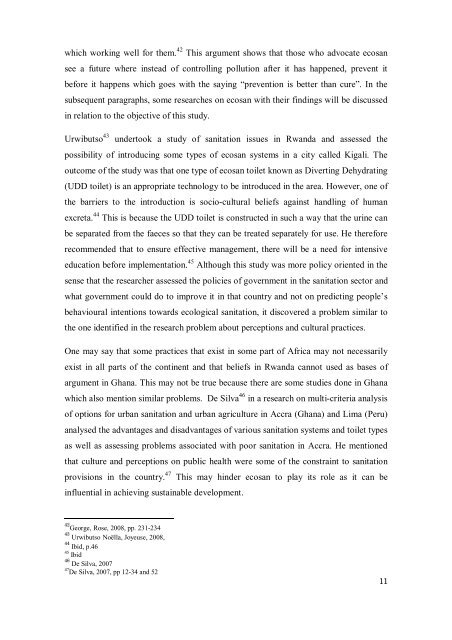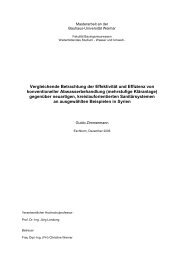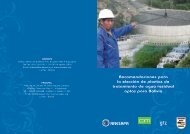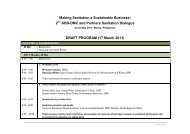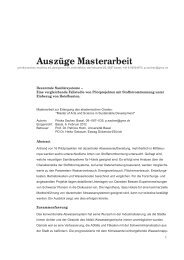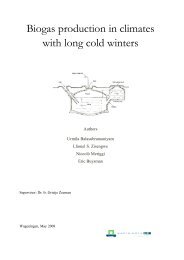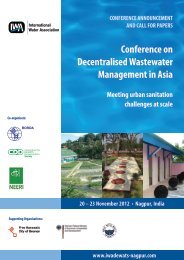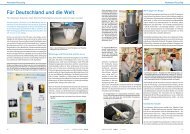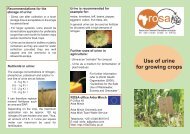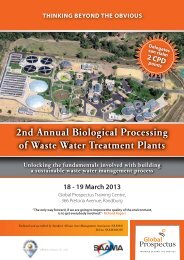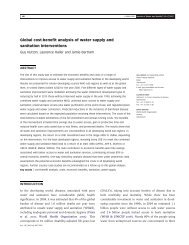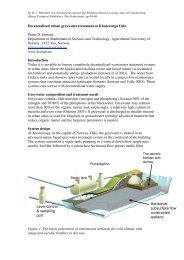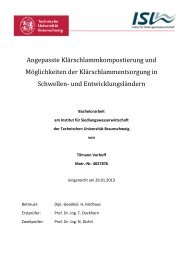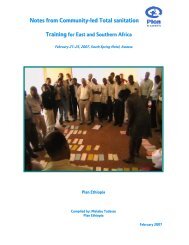A QUANTITATIVE APPROACH TO PREDICT ... - SuSanA
A QUANTITATIVE APPROACH TO PREDICT ... - SuSanA
A QUANTITATIVE APPROACH TO PREDICT ... - SuSanA
You also want an ePaper? Increase the reach of your titles
YUMPU automatically turns print PDFs into web optimized ePapers that Google loves.
which working well for them. 42 This argument shows that those who advocate ecosan<br />
see a future where instead of controlling pollution after it has happened, prevent it<br />
before it happens which goes with the saying “prevention is better than cure”. In the<br />
subsequent paragraphs, some researches on ecosan with their findings will be discussed<br />
in relation to the objective of this study.<br />
Urwibutso 43 undertook a study of sanitation issues in Rwanda and assessed the<br />
possibility of introducing some types of ecosan systems in a city called Kigali. The<br />
outcome of the study was that one type of ecosan toilet known as Diverting Dehydrating<br />
(UDD toilet) is an appropriate technology to be introduced in the area. However, one of<br />
the barriers to the introduction is socio-cultural beliefs against handling of human<br />
excreta. 44 This is because the UDD toilet is constructed in such a way that the urine can<br />
be separated from the faeces so that they can be treated separately for use. He therefore<br />
recommended that to ensure effective management, there will be a need for intensive<br />
education before implementation. 45 Although this study was more policy oriented in the<br />
sense that the researcher assessed the policies of government in the sanitation sector and<br />
what government could do to improve it in that country and not on predicting people’s<br />
behavioural intentions towards ecological sanitation, it discovered a problem similar to<br />
the one identified in the research problem about perceptions and cultural practices.<br />
One may say that some practices that exist in some part of Africa may not necessarily<br />
exist in all parts of the continent and that beliefs in Rwanda cannot used as bases of<br />
argument in Ghana. This may not be true because there are some studies done in Ghana<br />
which also mention similar problems. De Silva 46 in a research on multi-criteria analysis<br />
of options for urban sanitation and urban agriculture in Accra (Ghana) and Lima (Peru)<br />
analysed the advantages and disadvantages of various sanitation systems and toilet types<br />
as well as assessing problems associated with poor sanitation in Accra. He mentioned<br />
that culture and perceptions on public health were some of the constraint to sanitation<br />
provisions in the country. 47 This may hinder ecosan to play its role as it can be<br />
influential in achieving sustainable development.<br />
42 George, Rose, 2008, pp. 231-234<br />
43 Urwibutso Noëlla, Joyeuse, 2008,<br />
44 Ibid, p.46<br />
45 Ibid<br />
46 De Silva, 2007<br />
47 De Silva, 2007, pp 12-34 and 52<br />
11


